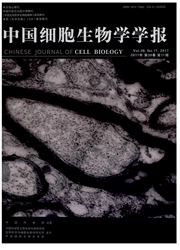

 中文摘要:
中文摘要:
目前,抗体介导的慢性肾移植排斥反应难以预测,尚无有效的治疗方法。研究表明,通过对内皮细胞相关基因的分析,可以提高抗体介导的慢性肾移植排斥反应术前及术后的诊断特异性。该病的发病机制主要包括四个方面:(1)血小板在内皮细胞附近聚集凝固能力增强;(2)内皮细胞趋化炎性细胞作用增强;(3)干扰素-γ(IFN-γ)杀伤作用增强:(4)内皮修复再生能力降低。基因分析结合抗体分析有助于深化理解抗体介导的肾移植排斥反应的发病机理、提高诊疗效果、为新药开发提供新靶点,使肾移植成功率大幅提高成为可能。该篇综述将就上述内容作一介绍。
 英文摘要:
英文摘要:
Currently, antibody-mediated rejection of renal aUograft is highly unpredictable and lack of ef- fective treatments. A number of studies show that the preoperative and postoperative diagnosises of renal allograft are improved by the analysis of endothelial cell associated genes. The pathogenesis of this disease mainly includes four aspects: (1) The aggregation and coagulation ability of platelet increases near in endothelial cells; (2) The chemotaxis of inflammatory cells by endothelial cells increases; (3) The effects of IFN-γ increase; (4) The ability of endothelial regeneration decreases. Gene analysis and antibody analysis contribute to deeply understanding of pathogenesis of renal allograft, provide new targets for drug development, and highly increase the successful rate of renal allograft. This paper will give a review about these contents mentioned above.
 同期刊论文项目
同期刊论文项目
 同项目期刊论文
同项目期刊论文
 PTEN suppresses the oncogenic function of AIB1 through decreasing its protein stability via mechanis
PTEN suppresses the oncogenic function of AIB1 through decreasing its protein stability via mechanis FOXK2 Transcription Factor Suppresses ER alpha-positive Breast Cancer Cell Growth Through Down-Regul
FOXK2 Transcription Factor Suppresses ER alpha-positive Breast Cancer Cell Growth Through Down-Regul EGF is required for cardiac differentiation of P19CL6 cells through interaction with GATA-4 in a tim
EGF is required for cardiac differentiation of P19CL6 cells through interaction with GATA-4 in a tim Induction of the CLOCK gene by E2-ERalpha signaling promotes the proliferation of breast cancer cell
Induction of the CLOCK gene by E2-ERalpha signaling promotes the proliferation of breast cancer cell DEC1 regulates breast cancer cell proliferation by stabilizing cyclin E protein and delays the progr
DEC1 regulates breast cancer cell proliferation by stabilizing cyclin E protein and delays the progr Switching of the Triplet Excited State of Rhodamine/Naphthaleneimide Dyads: An Experimental and Theo
Switching of the Triplet Excited State of Rhodamine/Naphthaleneimide Dyads: An Experimental and Theo The relationship between the inflammatory response and cell adhesion on alginate-chitosan-alginate m
The relationship between the inflammatory response and cell adhesion on alginate-chitosan-alginate m Contributory role of five common polymorphisms of RAGE and APE1 genes in lung cancer among Han Chine
Contributory role of five common polymorphisms of RAGE and APE1 genes in lung cancer among Han Chine DACH1 inhibits SNAI1-mediated epithelial-mesenchymal transition and represses breast carcinoma metas
DACH1 inhibits SNAI1-mediated epithelial-mesenchymal transition and represses breast carcinoma metas 期刊信息
期刊信息
